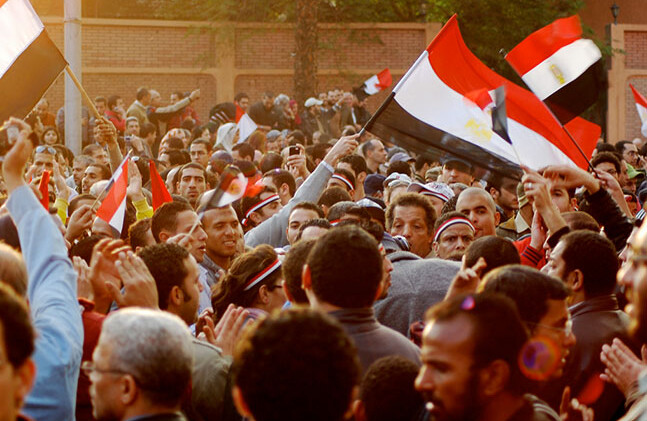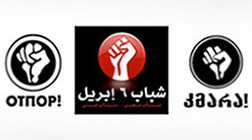Mena Mohamed is 15 years old and a sophomore at J.E.B. Stuart High School in Fairfax, Virginia. "I am originally from Egypt, and I am very interested in journalism, international relations/affairs, and lacrosse."
Essay Topic: What Does Moral Leadership Mean to You?
Moral Leaders: The Image of Hope
It is yet another morning in Fairfax, Virginia, and in all honesty, all here remains the same. The scenes outside my window echo those of yesterday and my routine is purely habitual. Despite the peace of the morning, however, a certain stress lies under the calm exterior of everyone in my family, as it has for a while now. I make my way to the living room, where my mother is already seated and has the Arabic news on for all worried eyes to see. Whether today's headlines will offer temporary relief or prolonged sadness is a question I have been asking myself daily now.
The answer, alas, is one that brings tears to my eyes. The images pour out of the small screen and imprint themselves in my mind until I cannot forget. The grainy videos show footage from my home country, Egypt. I watch, horror-struck, as the government's military forces disperse a peaceful protest against the new usurpers of the presidential powers from the elected executive, President Morsi. I watch as the tanks roll in, as gun-bearing men in black file in Rabaa square and surround the protestors. Triggers are pulled and the screams can be heard a mile away. Tear gas is sprayed, and flames roar up from the middle of the crowd. There are stampedes, blood, and a smattering of explosions. It is chaos in its purest form. And when the smoke clears, it is clear to me that something abhorrent had happened. Men, women, and children had been shot multiple times and had taken their last breath in Rabaa square. In only one day, 2,600 of men, women, and children had died at the hands of their very own government, setting the precedent for more bloody battles and more bloody corpses.
It may be yet another morning in Fairfax, Virginia, but there is yet another massacre happening in Egypt. In Syria. In Somalia. The world is, now more than ever, desperately in need of moral leadership to stop these atrocities from happening. The demise of my country into a larger pool of corruption and bloodlust has sometimes led me to believe that moral leadership no longer exists. In fact, I asked myself how these mass killings could continue to occur if it did exist. If there were respected leaders behind the scheme, then how could what I was seeing be true? My view of what moral leadership actually is altered, and I began to lose faith that there was hope for ethical leadership not only in Egypt, but also internationally.
In order to define what moral leadership means to me, I find it necessary to identify what it clearly is not. Through my exposure to these events, it was easy to decipher that many parts of what I was seeing on my television screen did not fit into my definition of what leadership should look like. Unfortunately, in today's world, it is easy to find examples of immoral leadership. Leaders should not overpower individuals to make them feel worthless. They should not keep incriminating secrets, scheme, or commit crimes for their own benefit. They should not force decisions on people, or imprison innocents. Above all, leaders should not be betrayers, liars, or murderers. Despite the truth in these characteristics, I can still look around and see "leaders" who act in this manner and are guilty of these actions, whether it be local or international. How can leaders that make such important decisions and have such a large range of influence commit such injustices? Thus, through bearing witness to titled leaders whose actions I deemed unethical, I came to realize that being a leader and being a moral leader are two very independent actions.
The paramount quality in leaders is that they possess a natural ability to captivate and influence people to action. This ability is probably the most powerful skill an individual could have, because an individual who has the ability to influence people to do good has an equal amount of ability to control them to do the opposite. In this way, leaders have two choices; to be leaders or to be moral leaders. All too often, people decide to follow the easier first choice. To me, moral leadership means leading with a moral compass, no matter the consequences. It means possessing a code of ethics that is never forgotten even in times of distress and hardship. It means leading with respect for others and with the best intentions for your constituents. It means putting personal interest second to the needs of others. Moral leaders are humane and just. They believe that unity can truly be achieved by a diversity of ideas and beliefs. They are courageous, have a sense of right and wrong, and work towards a vision of the betterment of society.
Harry S. Truman once said, "Men make history and not the other way around. In periods where there is no leadership, society stands still. Progress occurs when courageous, skillful leaders seize the opportunity to change things for the better." When people ponder moral leadership, images of Martin Luther King Jr., Nelson Mandela, and Gandhi are usually conjured up. While these three men all made history and led people to social and cultural progress, we do not have to look so far to find moral leaders. The truth is, moral leadership can be found anywhere. Global change is not necessary to being recognized as an ethical leader. Inspirational teachers, social entrepreneurs, and avid servers of the community are all moral leaders in their own right that are making essential changes to society and the world.
Although it may seem hard to believe, moral leadership is not impossible to find in today's society. As I have experienced, the world is a dark and sometimes horrific place, but it is not hopeless. Some of the best leaders to date have emerged from times of corruption and despair, and I believe that this era of defilement and darkness will prove to be no different in producing innovative and compassionate leaders. It takes but one moral leader to make a change and start a chain reaction. To make someone's day. To end the wars. To reverse poverty. To help others. To simply make the world a better place until morals and ethics are valued and cherished in our society and the headlines bring me to tears no longer.



